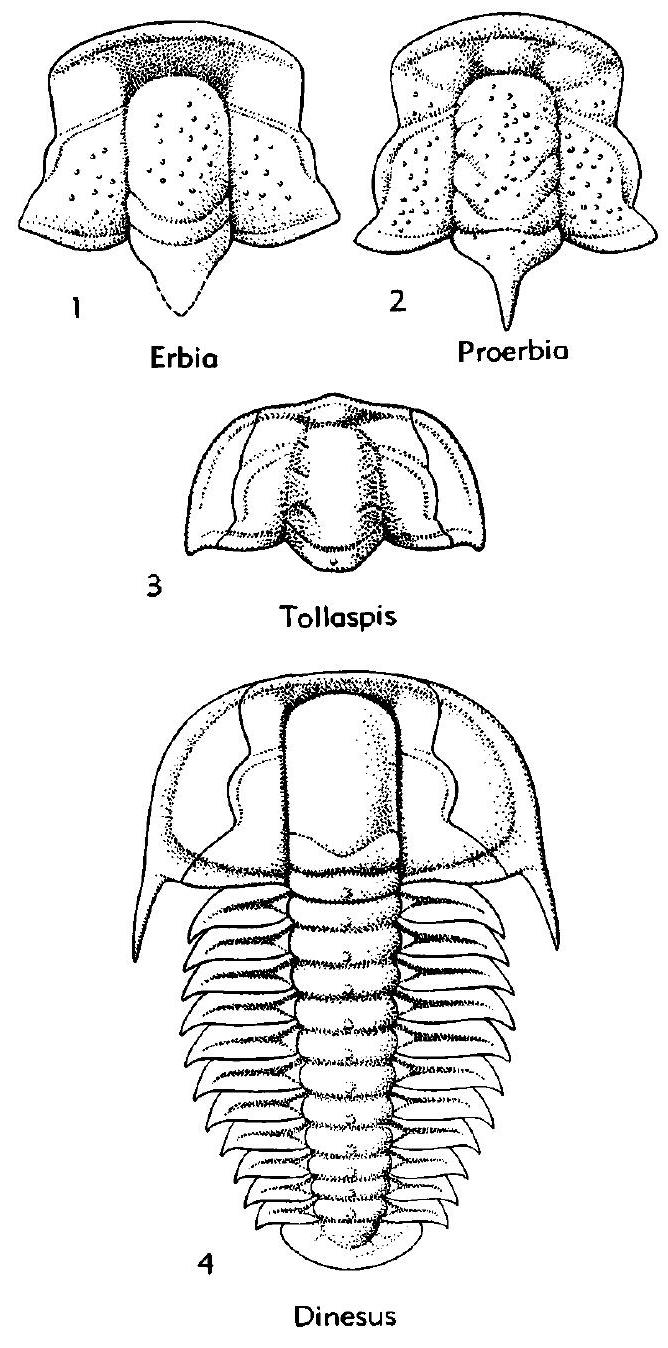Welcome to the Treatise on Invertebrate Paleontology!
Please enter a genera name to retrieve more information.

Dinesus
Classification
Phylum:
Arthropoda
Subphylum:
Trilobitomorpha
Class:
Trilobita
Order:
Corynexochida
Family:
Dinesidae
Formal Genus Name and Reference:
Dinesus Etheridge, JR., 1896
Type Species:
*D. ida
Images
(Click to enlarge in a new window)
Fig. 169, 4. *D. ida, NW. Queensl., exoskel., x1 (411).
Synonyms
Geographic Distribution
Austral
Age Range
Beginning Stage in Treatise Usage:
Low.M. Cam.
Beginning International Stage:
Cambrian Stage 4
Fraction Up In Beginning Stage:
40
Beginning Date:
512.3
Ending Stage in Treatise Usage:
Low.M. Cam.
Ending International Stage:
Wuliuan
Fraction Up In Ending Stage:
100
Ending Date:
504.5
Description
Glabella with single pair of posterior lateral furrows curved back to occipital furrow to produce basal lobes, with occipital node or small spine, preglabellar field very narrow, eyes of medium size, opposite center of glabella, fixigenae with palpebral areas more than 0.5 of glabellar width, posterior areas same length (tr.) as occipital ring. Thorax of 11 segments with short median axial spines or nodes. Pygidium narrowly transverse, axis semicircular, with poorly defined axial furrow, all pleural furrows obsolete
References
Museum or Author Information
Classification
Phylum:
Arthropoda
Subphylum:
Trilobitomorpha
Class:
Trilobita
Order:
Corynexochida
Family:
Dinesidae
Formal Genus Name and Reference:
Dinesus Etheridge, JR., 1896
Type Species:
*D. ida
Images
(Click to enlarge in a new window)
Fig. 169, 4. *D. ida, NW. Queensl., exoskel., x1 (411).
Synonyms
Geographic Distribution
Austral
Age Range
Beginning Stage in Treatise Usage:
Low.M. Cam.
Beginning International Stage:
Cambrian Stage 4
Fraction Up In Beginning Stage:
40
Beginning Date:
512.3
Ending Stage in Treatise Usage:
Low.M. Cam.
Ending International Stage:
Wuliuan
Fraction Up In Ending Stage:
100
Ending Date:
504.5
Description
Glabella with single pair of posterior lateral furrows curved back to occipital furrow to produce basal lobes, with occipital node or small spine, preglabellar field very narrow, eyes of medium size, opposite center of glabella, fixigenae with palpebral areas more than 0.5 of glabellar width, posterior areas same length (tr.) as occipital ring. Thorax of 11 segments with short median axial spines or nodes. Pygidium narrowly transverse, axis semicircular, with poorly defined axial furrow, all pleural furrows obsolete
